Mark Peters and David Wessel: More Men in Prime Working Ages Don’t Have Jobs

Mark Peters and David Wessel: More Men in Prime Working Ages Don’t Have Jobs: Mark Riley was 53 years old when he lost a job as a grant writer for an Arkansas community college.
“I was stunned,” he said. “It happened on my daughter’s 11th birthday.” His boss blamed state budget cuts. That was almost three years ago and he still hasn’t found steady work. Mr. Riley, whose unemployment benefits ran out 14 months ago, says his long and fruitless search is proof employers won’t hire men out of work too long. “We’re poor, but we’re not broke,” Mr. Riley said. “We still have property. We have cars. We have some assets, we just can’t liquidate them.”… More than one in six men ages 25 to 54, prime working years, don’t have jobs—a total of 10.4 million. Some are looking for jobs; many aren’t…. Having so many men out of work is partly a symptom of a U.S. economy slow to recover from the worst recession in 75 years. It is also a chronic condition that shows how technology and globalization are transforming jobs faster than many workers can adapt, economists say.
The trend has been building for decades, according to government data. In the early 1970s, just 6% of American men ages 25 to 54 were without jobs. By late 2007, it was 13%. In 2009, during the worst of the recession, nearly 20% didn’t have jobs. Although the economy is improving and the unemployment rate is falling, 17% of working-age men weren’t working in December. More than two-thirds said they weren’t looking for work….
For women, the story is different. In the 1950s, only about a third of women ages 25 to 54 had jobs. That rose steadily until the 1990s, and then leveled off….
Surveys find that most of the jobless spend their days in the same way working men spend weekends—watching TV, working out, sleeping. Economists say part of the problem is that men with few marketable skills and little education can’t find work that pays enough to get them off the couch. Since the early 1970s, the average inflation-adjusted wage for high-school dropouts has fallen about 25%; for high-school graduates with no college degree, it is down about 15%. Simply put, many of the available jobs don’t pay enough to get men to take them, particularly if securing a job requires moving, long commutes or surrendering government benefits….
Mr. Gilkes applies for at least two jobs a day, he said, but gets little response, especially when applying online…. Joseph Maloney… worked in back-office operations for commodity firms… didn’t keep pace with the changing technology…. The older Mr. Maloney was laid off in 2009 and turned to temporary jobs. In 2011, he had a heart transplant…. Over the past year, Mr. Maloney found temporary work as an information-technology support technician at the college where his wife is an executive assistant. His job ended in September, resumed in December and now, he said, he hopes it will be permanent….
Mr. Maloney’s desire to return to the workplace is exceptional among the growing ranks of unemployed men who seek and obtain federal disability benefits….
Levell Anderson, 52 years old, was so sure he would retire from the military with a comfortable pension that he made his expected last year of service, 2021, part of his email address. But he was discharged from the U.S. Army in May—short of the 20 years required for a full military pension—after he was partially disabled during a training exercise. He now uses a cane to walk. Mr. Anderson said that without training his disability and high-school education leave him with few ways to earn even half the $65,000-a-year he made as a staff sergeant…. Veterans typically can find $9-to $12-an-hour jobs in security or customer service, said Dale Prickett, who has worked with vets at a nonprofit community center and a college. The men, he said, are surprised at how tough it is to find $40,000-a-year jobs with a career path: “It is a shot to the gut.”
